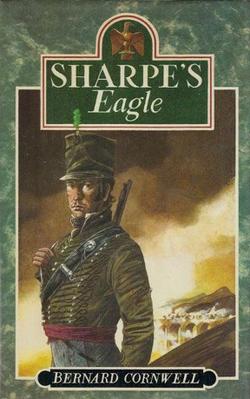Plot summary
It is July 1809. During the Talavera Campaign, Sir Arthur Wellesley's army has entered Spain to confront Marshal Victor. Richard Sharpe and his small group of thirty riflemen, separated from their regiment during the retreat from Corunna, are attached to the newly arrived South Essex Regiment. Commanded by the cowardly and bullying Lieutenant Colonel Sir Henry Simmerson, the South Essex is a raw, inexperienced unit that has been drilled mercilessly with frequent use of the lash.
Sharpe takes it upon himself to shape the inexperienced and poorly trained redcoats into soldiers. He comes into conflict with Simmerson; his nephew, the arrogant Lieutenant Christian Gibbons; and Christian's friend, Lieutenant John Berry. The situation is further complicated by the rivalry that emerges between Sharpe and Gibbons for the affections of Josefina Lacosta, a Portuguese noblewoman who ran away from her husband after he took a mistress. Only two of the South Essex officers appear to have any real experience: Captain Lennox, a veteran of the 78th Highlanders' action at the Battle of Assaye, where Sharpe himself won his commission; and Captain Thomas Leroy, an American Loyalist who was forced to flee his homeland after the American War of Independence.
From Talavera, General Wellesley dispatches the South Essex, alongside Sharpe's riflemen and Major Michael Hogan's engineers, to blow up the bridge at Valdelacasa, so as to protect the army's flank as they march. They accompany a Spanish regiment of equal number, the Regimento de la Santa Maria, the seemingly straightforward mission becomes a disaster when both Simmerson and the Spanish unnecessarily cross the bridge due to pride, and then try to engage four squadrons of French dragoons. Due to a combination of arrogance, poor training and incompetence, the two regiments are routed by the French, with hundreds of men killed and wounded, Lennox fatally wounded by the enemy, and the loss of the King's Colours. Sharpe, however, distinguishes himself during the skirmish by saving the South Essex's own colours and capturing a French cannon. As a dying request, Lennox asks Sharpe to take a French Imperial Eagle, "touched by the hand of Napoleon" himself, so as to erase the shame of losing the King's Colours.
Wellesley has Sharpe gazetted captain, and scolds Simmerson for his bad leadership. In an attempt to shift the blame for the fiasco, Sir Henry tries to make Sharpe a scapegoat and intends on ruining Sharpe's career via his connections at Horse Guards. Sharpe concludes that only by capturing an Eagle can he remain in the army and keep his promotion. He also makes enemies of Gibbons and Berry when Josefina falls out with Gibbons, and Sharpe takes her under his protection. They become lovers, although Sharpe is forced to accept sizable loans offered him by Hogan in order to keep Josefina in the manner she is used to. Later, after Josefina is raped by Gibbons and Berry, Sharpe swears vengeance. He murders Berry during a night-time skirmish against the French.
At the height of the Battle of Talavera, Simmerson panics at the approach of a French column, and orders the South Essex to withdraw, despite direct orders from the British 2nd Division commander, General "Daddy" Hill, opening a gap in the lines. Sharpe desperately deploys his men to delay the French from exploiting it.
Sharpe's old friend, Lieutenant Colonel William Lawford, relieves Simmerson of command and orders the South Essex back into position, where their volleys destroy the column's cohesion. Sharpe leads the Light Company and his rifles into the fray and captures a French regiment's Eagle. Returning from the battlefield, Sharpe is ambushed by Gibbons, who attempts to murder Sharpe and take the Eagle for himself, but is killed by Harper. The capture of the Eagle secures Sharpe's promotion and restores the honour of the South Essex, but Sharpe's triumph is soured somewhat by Josefina's return to Lisbon, under the protection of a wealthy and aristocratic British cavalry captain.
Over a celebratory dinner, Wellesley bitterly informs his staff officers that, although the battle was won, the campaign will be accounted a failure, since Spanish General Cuesta has blundered badly, forcing the British to retreat back to Portugal. Wellesley promises that the British will return to Spain, but on their own terms. To Sharpe's surprise and embarrassment, Wellesley concludes his speech by proposing a toast to "Sharpe's Eagle." (This begins Cornwell's practice, in nearly all the Sharpe novels, of ending a book with the use of its title.)
